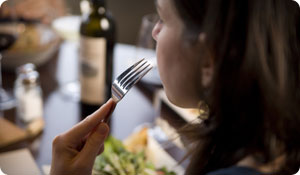
Sharing meals is at the heart of most social activities with family and friends. If you have Crohn's disease, you know firsthand that dining out can be difficult.
However, there's no reason your social life should take a back seat. The key to dining out successfully is to plan carefully and be mindful of what you eat.
Before you go
Unfortunately, there's no one-size-fits-all diet with Crohn's. If you've been living with the disease for awhile, you know which foods trigger symptoms. Most restaurants now post menus online so you can determine if they have entrées you can order. If not, contact the restaurant ahead of time and make a special request.
The Crohn's and Colitis Foundation of America estimates that one million Americans have Inflammatory Bowel Disease; roughly half are Crohn's sufferers. Many other illnesses also require special diets, so you're in good company and most restaurants are accustomed to making menu modifications.
If you can't choose the restaurant, or the menu is limited, eat before you go. You won't be hungry when you arrive and will enjoy your outing without worrying about a growling tummy-or worse.
Drink plenty of fluids. You're at risk for dehydration, so drink before you go and continue consuming fluids with your meal. Remember to sip, rather than gulp, your drink to prevent air from irritating your digestive system.
Dining Out
When you arrive, immediately locate the rest rooms. You'll know where they are, and the most direct route, if you must quickly excuse yourself.
Crohn's patients typically feel better eating smaller meals more frequently. Consider ordering an appetizer, an item from the children's menu, or sharing an entree with someone. Dining out is not the time to super-size your meal.
In general, stick with bland food. It might not titillate your taste buds, but it will help prevent triggering unpleasant symptoms. Choose foods that are broiled or baked, and minimize sauces, gravy and other fat-ladened toppings. Likewise, avoid fried or greasy foods and spicy dishes. Be wary of certain hard or high fiber foods, such as nuts, seeds, corn or whole peas, for example, which may be difficult to digest.
If you're lactose intolerant (this is common even with people who don't have Crohn's), avoid milk products or carry a supply of lactase (available in most grocery stores and pharmacies), which helps your body digest the irritating lactose in diary foods.
Take control. Ask how food is prepared, and don't be shy about requesting modifications.
Above all: relax. Stress can trigger symptoms and ruin your evening. Remember to plan ahead, make careful food choices, then sit back and enjoy yourself.





